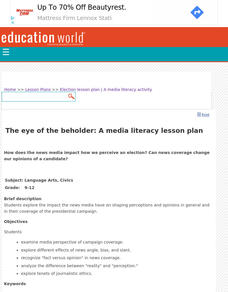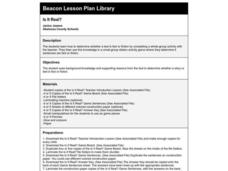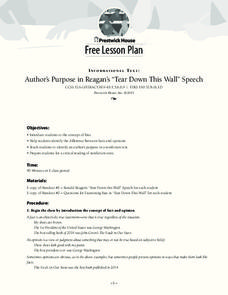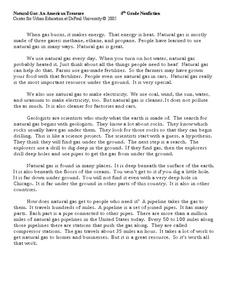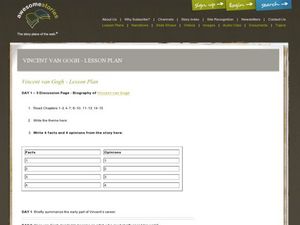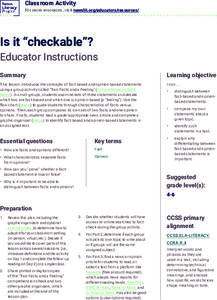Curated OER
CHRISTMAS FILM REVIEW
Students write reviews of films they have seen over the Christmas holidays. They study what the ingredients of a film review are, and examine the difference between fact and opinion.
Curated OER
Good News/Bad News/Who Cares?
Students practice evaluating facts, bringing to bear their own experience, preferences, and international contexts. They recognize that there are many ways of interpreting a single piece of information and form the habit of reflecting...
Curated OER
The Eye of the Beholder: A Media Literacy Activity
High schoolers explore the impact the news media have on shaping perceptions and opinions in general and in their coverage of the presidential campaign.
Curated OER
Is It Real?
First graders see how to determine whether a text is fact or fiction by completing a whole-group activity with the teacher. They use this knowledge in a small-group station activity game where they determine if sentences are fact or...
Curated OER
What Is the Nature of Science?
Students distinguish between scientific and everyday meanings of key words-theory, hypothesis, law, fact-and use in context. They recognize the variables that affect observation, data collection, and interpretation. They discover the...
Curated OER
Discussing Non-Fiction Texts
Discuss non-fiction texts and fact and opinion. Learners discuss the features of non-fiction text, identify how to distinguish fact from opinion, and list ways to display information, including graphs, charts, and diagrams. While this is...
Curated OER
Opinion/Facts: letters to the editor and endorsement
In this opinion and facts worksheet, learners write the opinion and facts of letters to the editor that are for and against a candidate running for office. Students also write the propaganda technique used and example of an endorsement...
Education Bureau of Hong Kong
Evaluating Casual Claims
Responsible decision making relies on the ability to a recognize, analyze, and evaluate claims. The worksheets and activities in this 32-page packet teach learners how to distinguish among opinions, reasoned arguments, facts, and logical...
Prestwick House
Author’s Purpose in Reagan’s “Tear Down This Wall” Speech
President Ronald Reagan's "Tear Down This Wall" speech, delivered on June 12, 1987 before the Berlin Wall, provides class members with an opportunity to examine three key aspects of informational text: author bias, the use of facts and...
Curated OER
Natural Gas: An American Treasure
Do your fourth graders need extra practice with evaluating fact and opinion? An informative resource provides two reading passages in which learners distinguish sentences as fact or as opinion. Additionally, they determine how the...
Curated OER
Awesome Stories: Vincent van Gogh
Who was Vincent van Gogh? Most of the questions can be answered in two or three sentences; however, there is at least one essay prompt and one personal response question that require longer answers. Questions call for a good mix of...
Curated OER
Correcting Errors in Sentences
In this proofreading activity, students correct the grammar errors in three sentences. Students tell whether 4 sentences are facts or opinions. Students combine sentences and also write antonyms for 3 words.
Curated OER
Conventions: Strong Verbs
Fifth graders practice using strong verbs. In this conventions lesson, 5th graders brainstorm words to complete sentences and list lively and exciting verbs. Students act out meanings of certain words. Students come up with new ways to...
Curated OER
Fact and Opinion Graphic Organizer
In this language arts worksheet, students use this graphic organizer chart to record a topic and facts and opinions. There are no directions given for use of the chart.
Curated OER
Equal Protection of the Law: Fact or Fiction
High schoolers focus on the 14th Amendment of the Bill of Rights to decide whether or not racism denies citizens of their rights under the amendment. They watch a movie, Every Two Seconds and complete a worksheet (included in the plan)...
Beyond Benign
Medical Ethics
Just because we have the ability to determine an organism's traits through genetic testing, should we do it? Middle-school medical experts examine the ethical dilemmas in biotechnology in the 18th and final installment in a series of...
The New York Times
Evaluating Sources in a ‘Post-Truth’ World: Ideas for Teaching and Learning about Fake News
The framers of the United States Constitution felt a free press was so essential to a democracy that they granted the press the protection it needed to hold the powerful to account in the First Amendment. Today, digital natives need to...
Curated OER
Is That a Fact, Harry?
Students use excerpts from books to determine whether sentences are fact, fiction, or opinion. They state reasons for their choices.
Curated OER
Fact and Opinion
In this writing activity, students identify and describe the difference between a fact and an opinion. They place the cut-up words from the house ad in the correct column to indicate if they are fact or opinion.
Curated OER
Amelia Earhart: Fact Or Myth
In this reading and history instructional activity, students research Amelia Earhart and make lists of what they believe to be facts and what they think are myths, legends and theory. No information or examples are given on this page.
Curated OER
Fast Facts
In this reviewing social studies facts learning exercise, students observe facts in the columns labeled New England, the Middle Colonies, and Southern area of the United States, categorize using one fact from each column, and write...
Curated OER
Persuasive Writing - Anticipating Opposing Views
Persuasion, when used effectively, is a powerful and effective tool. In groups, young writers develop a persuasive letter about something that they would like their parents to allow them to do. Then, independently, they use proper...
News Literacy Project
Is It “Checkable”?
Upper elementary scholars test their checking skills with a lesson that challenges them to distinguish between fact and opinion. First, the class takes part in a discussion regarding a helpful flow chart. Next, learners follow the flow...
Newseum
The Fundamentals of News
A short video introduces middle schoolers to different media-related news terms. Viewers then complete a worksheet and discuss the differences between news and journalism, between facts and opinions.
Other popular searches
- Fact Opinion Lesson Plans
- Fact and Opinion Passages
- Fact Opinion Worksheet
- Fact and Opinion Lessons
- Teaching Fact vs. Opinion
- Fact and Opinion Worksheets
- Teaching Fact and Opinion
- Fact and Opinion Games
- Reading Fact and Opinion
- Fact and Opinion Keywords
- Identifying Fact or Opinion
- Fact Opinion Quiz


